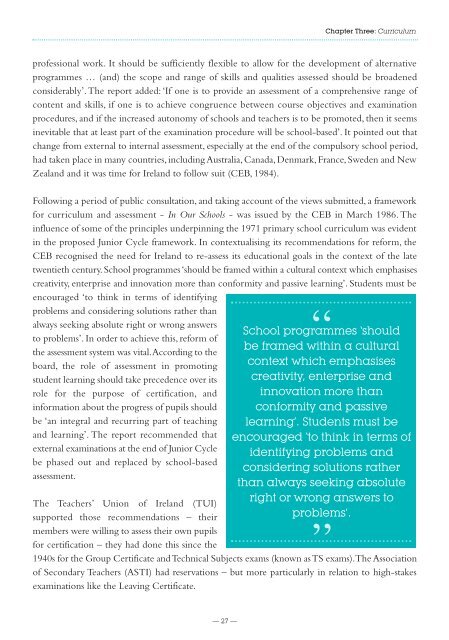Towards a Better Future
A Review of the Irish School System John Coolahan | Sheelagh Drudy Pádraig Hogan | Áine Hyland | Séamus McGuinness
A Review of the Irish School System
John Coolahan | Sheelagh Drudy Pádraig Hogan | Áine Hyland | Séamus McGuinness
You also want an ePaper? Increase the reach of your titles
YUMPU automatically turns print PDFs into web optimized ePapers that Google loves.
Chapter Three: Curriculum<br />
professional work. It should be sufficiently flexible to allow for the development of alternative<br />
programmes … (and) the scope and range of skills and qualities assessed should be broadened<br />
considerably’. The report added: ‘If one is to provide an assessment of a comprehensive range of<br />
content and skills, if one is to achieve congruence between course objectives and examination<br />
procedures, and if the increased autonomy of schools and teachers is to be promoted, then it seems<br />
inevitable that at least part of the examination procedure will be school-based’. It pointed out that<br />
change from external to internal assessment, especially at the end of the compulsory school period,<br />
had taken place in many countries, including Australia, Canada, Denmark, France, Sweden and New<br />
Zealand and it was time for Ireland to follow suit (CEB, 1984).<br />
Following a period of public consultation, and taking account of the views submitted, a framework<br />
for curriculum and assessment - In Our Schools - was issued by the CEB in March 1986. The<br />
influence of some of the principles underpinning the 1971 primary school curriculum was evident<br />
in the proposed Junior Cycle framework. In contextualising its recommendations for reform, the<br />
CEB recognised the need for Ireland to re-assess its educational goals in the context of the late<br />
twentieth century. School programmes ‘should be framed within a cultural context which emphasises<br />
creativity, enterprise and innovation more than conformity and passive learning’. Students must be<br />
encouraged ‘to think in terms of identifying<br />
problems and considering solutions rather than<br />
“<br />
always seeking absolute right or wrong answers<br />
to problems’. In order to achieve this, reform of<br />
the assessment system was vital. According to the<br />
board, the role of assessment in promoting<br />
student learning should take precedence over its<br />
role for the purpose of certification, and<br />
information about the progress of pupils should<br />
be ‘an integral and recurring part of teaching<br />
and learning’. The report recommended that<br />
external examinations at the end of Junior Cycle<br />
be phased out and replaced by school-based<br />
assessment.<br />
The Teachers’ Union of Ireland (TUI)<br />
supported those recommendations – their<br />
members were willing to assess their own pupils<br />
for certification – they had done this since the<br />
School programmes ‘should<br />
be framed within a cultural<br />
context which emphasises<br />
creativity, enterprise and<br />
innovation more than<br />
conformity and passive<br />
learning’. Students must be<br />
encouraged ‘to think in terms of<br />
identifying problems and<br />
considering solutions rather<br />
than always seeking absolute<br />
right or wrong answers to<br />
problems’.<br />
”<br />
1940s for the Group Certificate and Technical Subjects exams (known as TS exams). The Association<br />
of Secondary Teachers (ASTI) had reservations – but more particularly in relation to high-stakes<br />
examinations like the Leaving Certificate.<br />
— 27 —



